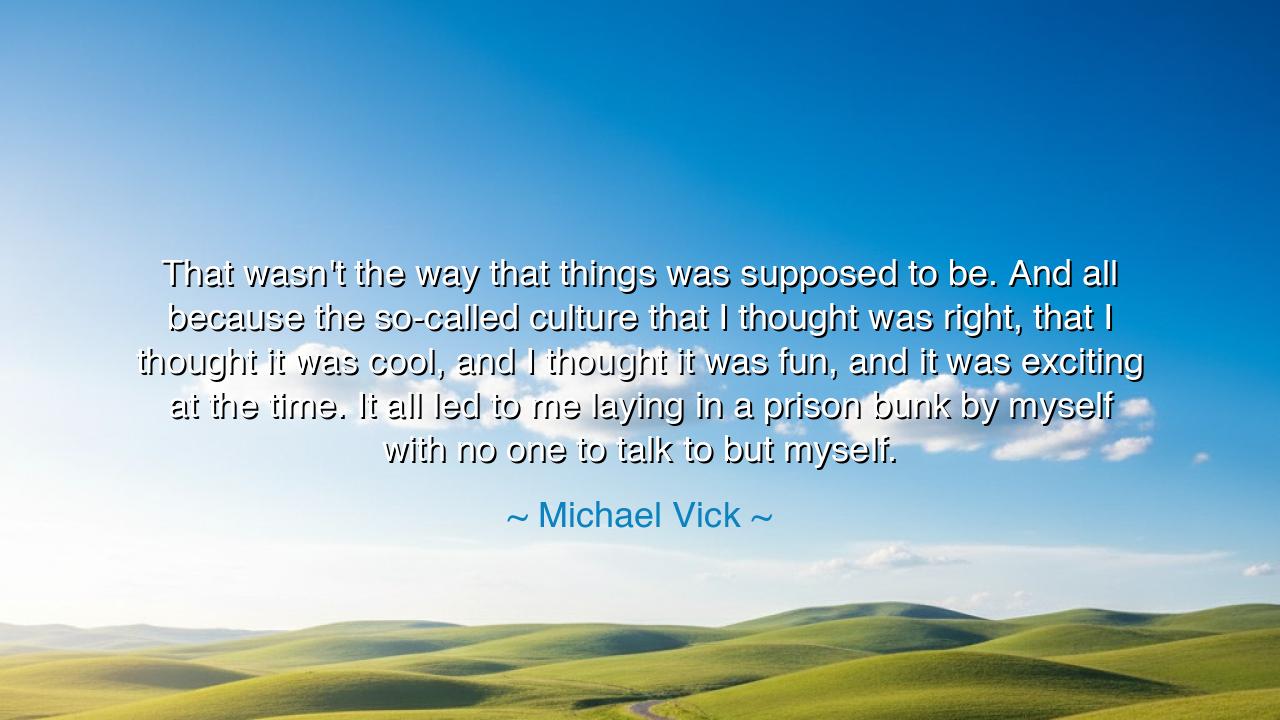
That wasn't the way that things was supposed to be. And all
That wasn't the way that things was supposed to be. And all because the so-called culture that I thought was right, that I thought it was cool, and I thought it was fun, and it was exciting at the time. It all led to me laying in a prison bunk by myself with no one to talk to but myself.






"That wasn't the way that things was supposed to be. And all because the so-called culture that I thought was right, that I thought it was cool, and I thought it was fun, and it was exciting at the time. It all led to me laying in a prison bunk by myself with no one to talk to but myself." These words from Michael Vick, a man whose once bright future as a football star was dimmed by his choices, reflect the painful realization that the path we walk is often shaped by the cultures and values we accept, and the consequences of those decisions can be far more severe than we ever imagine. In his reflection, Vick laments how what seemed like fun, excitement, and the allure of the cool things in life led him to a place of profound isolation and regret—laying in a prison bunk, cut off from the world and his future.
Vick's story is one that mirrors the journeys of many who are swept up by the culture of their time, believing that they are merely following what is expected or what is admired. The allure of fame, money, and the recognition that came with being a professional athlete blinded him to the deeper truths of his actions. His fall from grace was not sudden but built upon a series of small compromises and misguided choices, all stemming from the belief that he was in control, that the world he inhabited—one of flash, bravado, and instant gratification—was the right one. Socrates, the great philosopher, warned that “An unexamined life is not worth living.” Vick’s story shows the truth of this warning: when we fail to question the culture we live in, we risk losing our way, as Vick did.
Consider the story of King David in the Bible. As a young man, David was a warrior, a king, and a hero to his people. However, as he ascended to power, he became intoxicated by his own success and the culture of royalty. He made a series of choices, the most famous being his affair with Bathsheba and the murder of her husband, Uriah. These actions, fueled by a sense of entitlement and a belief that he could have whatever he desired, led to heartache, betrayal, and ultimately, a divided kingdom. David, like Vick, was a man whose fall from grace was marked by the misguided choices of a man who thought the culture of power and privilege would protect him. Only in the silence of his own reflection did he realize the true cost of his actions—just as Vick did in the solitude of his prison cell.
Vick’s words echo the ancient wisdom that no matter how “cool” or “fun” a certain lifestyle may seem, it is the choices we make that define us—not the fleeting pleasures of the world around us. The Buddha taught that attachment to worldly pleasures and material success leads to suffering, for it blinds us to the deeper truths of existence. Vick, in the prime of his career, was attached to the thrills and rewards of fame, believing they were the culmination of a life well-lived. But it was only through his fall—his exile, his time spent in the prison bunk, forced to face himself—that he came to understand the deeper cost of his choices. The culture he thought was right, the culture he thought was exciting, turned out to be a prison of his own making.
This story is not just Vick’s; it is the story of countless others who chase after material success, believing that happiness lies in possessions, power, or momentary satisfaction. But, as Ralph Waldo Emerson once said, "What lies behind us and what lies before us are tiny matters compared to what lies within us." The true power comes from knowing who we are, understanding the deeper currents of our choices, and choosing the path that aligns with our true selves—not the one dictated by external culture. Vick’s redemption came when he faced his own inner demons, recognizing that the external world he had once idolized could not bring him the peace he sought.
The lesson here is clear: Examine your life and the world you live in. Do not blindly follow the culture that promises you instant gratification or the illusion of success. Question whether the choices you are making are truly aligned with the person you wish to become, not just the image you wish to project to the world. It is easy to be swayed by what seems "cool," but real success lies in the deeper, often quieter, decisions we make every day—the ones that define our character and our legacy.
In the practical sense, this means seeking self-awareness in our own lives. Just as Vick eventually turned to reflect on his choices, we must look inward to examine the influences shaping our actions. Are we living by authentic values, or are we driven by the transient desires of the culture around us? Let us seek wisdom and reflection in our daily choices, recognizing that it is the quiet decisions of integrity, humility, and self-discipline that will ultimately lead to a life of true fulfillment. We must choose wisely, for every action shapes the future we will live in.






AAdministratorAdministrator
Welcome, honored guests. Please leave a comment, we will respond soon